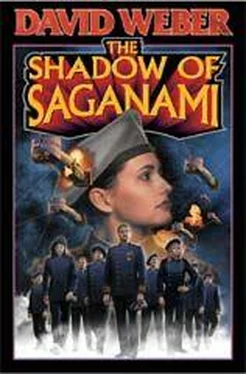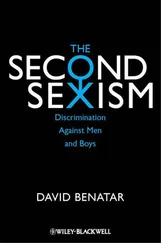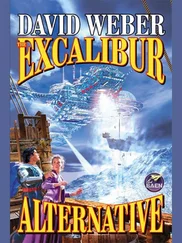"The most significant thing about the last presidential election was that the Reconciliation Party launched an aggressive voter registration campaign among the working class districts of Kornati's major cities. I don't think Tonkovic and her allies believed that effort could have any practical effect on the outcome of the campaign, but they found out differently. Tonkovic only won because two other candidates withdrew and threw their support to her. Even so, she managed to outpoll Rajkovic by a majority of barely six percent on Election Day, and that was with eleven percent of the total vote split between eight additional candidates."
Van Dort paused, smiling nastily, and chuckled.
"That must've come pretty close to scaring Aleksandra right out of her knickers," he said with relish. "Especially because, under the Kornatian Constitution, the vice presidency goes to the presidential candidate who pulled the second-highest total of votes. Which means-"
"Which means the fellow she had to leave in charge on Kornati when she went scampering off to Spindle is her worst political enemy," Terekhov finished for him, and it was his turn to chuckle. Then he shook his head. "Lord! What idiot thought up that system? I can't conceive of anything better designed to cripple the executive branch!"
"I expect that's exactly what the drafters of the original Constitution had in mind. Not that it's meant a lot over the past several decades, since, until the Reconciliation Party came along, there wasn't really any significant difference between the platforms of any of the presidential candidates who stood much chance of winning either office.
"But, after the last presidential election, Rajkovic and his allies-which, at that time, still included Agnes Nordbrandt-controlled the vice presidency and about forty-five percent of the seats in the Kornatian Parliament. Tonkovic's Democratic Centralists and the Social Moderates between them controlled the presidency and about fifty-two percent of Parliament, and the remaining three percent or so of the vote was scattered among more than a dozen marginal so-called parties, many of which managed to elect only a single deputy. I haven't seen the most recent figures, but when Nordbrandt's NRP disintegrated during the plebiscite campaign, Rajkovic lost enough deputies to drop his representation in Parliament to around forty-three percent, and Tonkovic picked up about half of what Rajkovic lost. I have no idea, at this point, how Nordbrandt's terrorist campaign has affected the balance in Parliament. I'd expect that from Rajkovic's perspective, the effect hasn't been good.
"On the other hand, Aleksandra has the problem that her strongest, most serious political rival is the acting head of state back home. Because he's only the acting head of state, he's pretty much stuck with the Cabinet Tonkovic selected and Parliament approved before annexation ever came up. She probably figures that the combination of passive resistance within the Cabinet, plus the fact that he doesn't control a majority in Parliament, will prevent Rajkovic from doing anything especially dangerous while she deals with the Constitutional Convention in Spindle. On the other hand, he is at home, at the center of the government and the entire political system, which gives him the home court advantage to set against all of her efforts to hobble him."
"That," Terekhov said, after a moment, "sounds like a remarkably good recipe for political and economic disaster."
"It isn't a good situation, but it isn't quite as bad as a bare recitation of the political alliances and maneuverings involved might suggest. For instance, a surprisingly high percentage of their civil service is both honest and reasonably efficient, despite the oligrachic political system. As far as I can tell, the Kornatian National Police are also reasonably honest and efficient, and Colonel Basaricek does her level best to keep her people out of politics and out of the hip pockets of the local elite. In fact, she's apparently been working on reinforcing a more traditional view of the entire citizenry's civil rights among her personnel over the last five or ten T-years. Enough so that she's drawn some noticeable political flak from people who value domestic tranquility over the rights of troublemakers.
"The biggest political problem's the way the electorate's grown increasingly apathetic over the past several decades. There's always been a strong tradition of patronage on Kornati, and these days that translates into clients who vote in accordance with their patrons' desires in return for a degree of security and protection in an economy that isn't doing well. Coupled with the extremely low level of voter registration, that's how a very small percentage of the total population's managed to take control of the legislative process. Which is another huge difference between Split and Dresden… and one reason Dresden is overtaking Split economically so rapidly."
"We've seen that system before," Terekhov said grimly. "It was called the People's Republic of Haven."
"Split isn't anywhere near that bad yet, but I'd have to say it has the potential to end up that way. Unless, of course, Rajkovic's accomplishment in the last presidential election reverses the trend. My impression is that, at least until Nordbrandt started killing people, Aleksandra and her colleagues believed Rajkovic's campaign represented an anomaly. I think they hoped-probably with reason-that if they managed to stymie his efforts to make genuine, large-scale progress in opening up the system, as his party platform called for, the first-time voters who came out in his support would decide the system doesn't work, after all. If they go home again, and decline to vote in future elections, it'll be business as usual for the oligarchs."
"And that's why Tonkovic doesn't want anybody upsetting her own little playhouse, is that it?"
"I'd say so, yes." Van Dort looked troubled. "I wondered what Aleksandra had in mind when she supported the original plebiscite so enthusiastically. In my opinion, she was driven far more by fear of being ingested by Frontier Security than by the advantages membership in the Star Kingdom might bring to her planet and its economy. Where the majority of the Convention's delegates, including a majority of the oligarchs, see annexation as an opportunity to improve the lives, health, and life expectancy of their worlds' citizens, Aleksandra doesn't, really.
"I'm not saying the other oligarchs are saints, because they're not. They figure that if the economy improves for everyone, those already at the top of the heap will improve their situations even more. But I do think most of them're able to look at least a short distance past the limits of their own greedy self-interest. I don't really think Aleksandra is. Worse, I don't think she realizes she isn't . She and the people she associates with on Kornati-the people she thinks of as the 'real' Kornatians-are quite well off as things are. The people who aren't 'real' to her don't matter. Don't even exist, except as threats to the ones who are 'real.' So what they want the Star Kingdom to do is to protect them from the League's bureaucratic nightmare and otherwise leave them alone. And I'm afraid Aleksandra, despite having quite a good mind, actually, has been extrapolating from her own experience in Split when she visualizes the Star Kingdom. I'm convinced that when she and her closest associates decided to support the plebiscite, they believed the Star Kingdom's version of representative government was essentially a fa ade. That they'd be able to continue business as usual even after the annexation went through."
"Well, they're in for a disappointment," Terekhov said with a harsh chuckle. "Just wait until a few sharp Manticoran business types start lining up local partners! Investment capital won't be a problem much longer, and once the Kornatians have hard money in their pockets, and something to spend it on, the economic climate's going to undergo a major change. And when that happens, their comfortable little closed political shop is going to find its windows smashed in, too. If they didn't like what happened in the last presidential election, they really won't like what a Manticoran election looks like!"
Читать дальше












